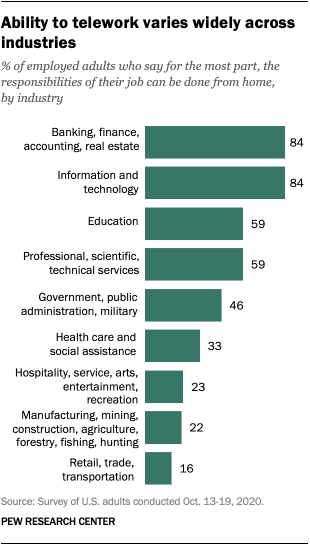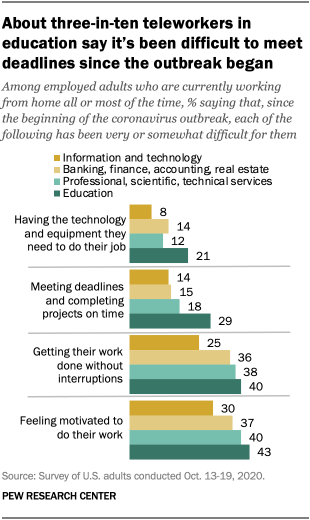Telework is really hard for lots of amid COVID-19 even in sectors exactly where it’s prevalent

The coronavirus outbreak introduced with it a main change to telework in lots of industries. Regardless of what their existing policies for telework may perhaps have been, some industries, these as the insurance policy, professional and technical products and services and info sectors, were improved poised to shift to telework at the get started of the pandemic.

A majority of employees in only 4 out of the nine grouped industries studied say that, for the most part, the obligations of their job can be performed from property, according to a Pew Investigate Heart survey executed in October. Inside these sectors, based mostly on definitions by the U.S. Census Bureau, those stating their position can be finished from property include things like 84% in banking, finance, accounting and genuine estate, 84% in information and facts and know-how, 59% in education and learning and 59% in skilled, scientific and complex providers.
Among workers in these four industries who say the duties of their position can predominantly be accomplished from house, about half or extra say they not often or hardly ever teleworked right before the pandemic, and this is in particular the situation amid individuals in the schooling sector (75% say they hardly ever or in no way teleworked). But majorities in all of these industries who say their occupation can primarily be performed from residence report that they are now doing the job from house all or most of the time. This involves 90% in the data and technology sector, 75% in professional, scientific and complex products and services, 74% in banking, finance, accounting and actual estate and 61% in schooling.
Pew Research Middle performed this study to evaluate the elevated reliance on telework as offices closed for the duration of the coronavirus pandemic. This analysis is dependent on 5,858 U.S. grownups who are doing the job aspect time or full time and who have only one particular job, or who have extra than one occupation but take into account one particular of them to be principal. The information was gathered as a aspect of a much larger study executed Oct. 13-19, 2020. Everyone who took aspect is a member of the Center’s American Trends Panel (ATP), an online study panel that is recruited through countrywide, random sampling of household addresses. This way practically all U.S. adults have a opportunity of assortment. The survey is weighted to be representative of the U.S. adult population by gender, race, ethnicity, partisan affiliation, education and learning and other categories. Read through a lot more about the ATP’s methodology.
Below are the questions applied for this report, alongside with responses, and its methodology.

Adults utilized in training who are working from household all or most of the time have had a more durable time meeting deadlines and finishing initiatives on time than those in other industries in which doing work from home is frequent. About 3-in-10 (29%) say this has been complicated, in comparison with 18% in experienced, scientific and specialized expert services, 15% in banking, finance, accounting and genuine estate, and 14% in information and know-how.
And between teleworkers who are in the very same career as before the pandemic, 38% of these in the instruction sector say it is now harder for them to balance perform and family tasks than prior to the coronavirus outbreak – extra than the shares in banking, finance, accounting and authentic estate (26%) and information and technologies (24%) who say the similar.
In convert, teleworkers in details and know-how are significantly less very likely than all those in the other 3 industries to say it’s been tricky for them to get their do the job performed devoid of interruptions even though performing from property: A quarter in this sector say this, in contrast with 40% of teleworkers in schooling, 38% in expert, scientific and specialized products and services and 36% of those people in banking, finance, accounting and authentic estate.
Between people who use video calling or on the net conferencing at minimum some though teleworking, workers in education and learning (44%) are far more very likely than those people in banking, finance, accounting and true estate (29%) and information and technologies (25%) to say they are worn out by the amount of time they devote on video clip calls a 3rd of employees in professional, scientific and technical companies say this. Regardless of the drain of video clip phone calls for some, additional than 50 % of employees in each and every of these industries say on the internet instruments are a superior substitute for in-man or woman make contact with.
Even though on line equipment may perhaps support substitute for in-person get in touch with, lots of personnel teleworking all or most of the time experience far more disconnected from their colleagues. Among the teleworkers in the same career they experienced ahead of the outbreak, those in the area of training, as effectively as those in the professional, scientific and specialized solutions industry, are specially very likely to say they feel much less related to their co-staff than prior to the pandemic (66% each and every). About fifty percent of those employed in information and facts and technological innovation (50%) and banking, finance, accounting and genuine estate (49%) say the similar.
About half or additional of workers in these industries who are in the exact career as they have been right before the pandemic say they have noticed no improve in their productivity, chances for development or work safety.
Be aware: Below are the questions utilised for this report, alongside with responses, and its methodology.




